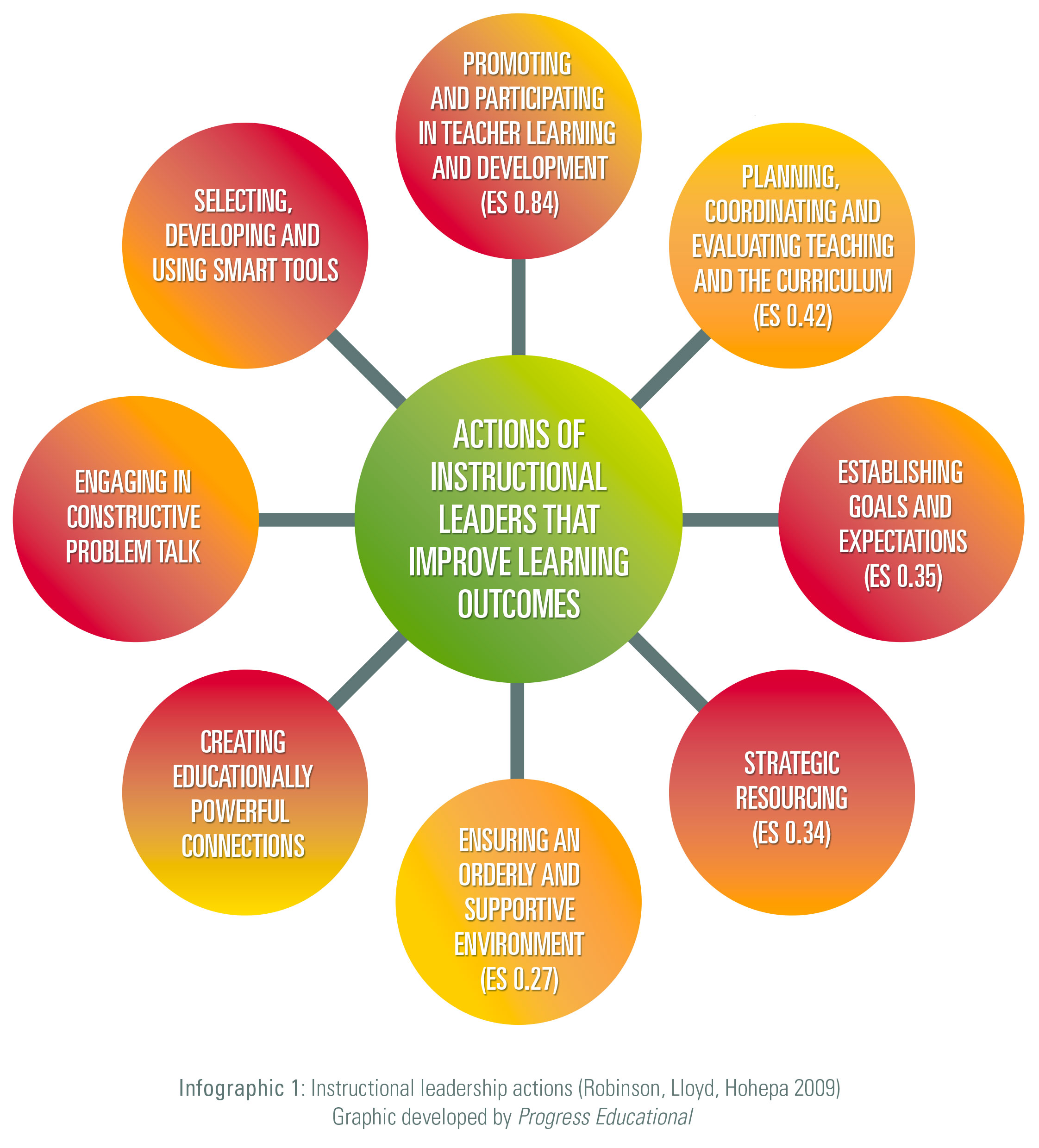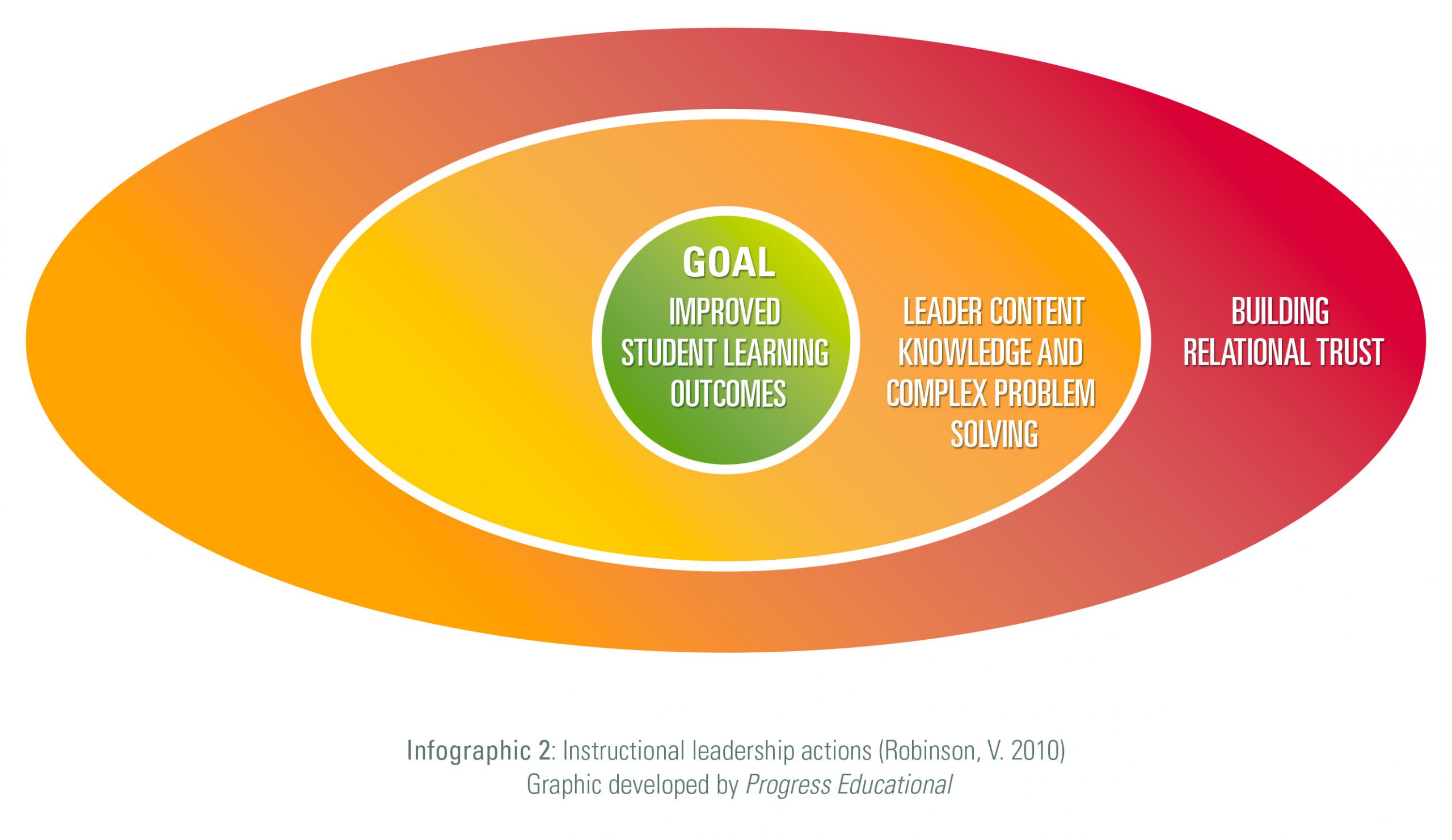Three capabilities capture the essence of instructional leadership and its actions; building relational trust, leader content knowledge and complex problem solving. When skilfully integrated they position leaders as active contributors to teacher development which leverages improved student learning outcomes.
Our friends at Google tells us that leadership is ‘a process by which an executive can direct, guide and influence the behaviour and work of others towards accomplishment of specific goals in a given situation’. For those of us who find ourselves leading we know our role is inherently social in nature, a true human endeavour, where success is largely dependent on relationships.
There is a lot known, and theorised, about the construct of leadership, having been an area of intense research for many decades. Whilst there are many different types of leadership only a few relate directly to the educational sphere: transformational leadership, distributive leadership and instructional leadership. Of these, one stands above all others: instructional leadership. In her meta-analysis Professor Vivienne Robinson has been able to quantify its impact on improved student learning outcomes identifying an effect size of 0.42, almost 4 times greater than that of transformational leadership with an effect size of 0.11.
Given its significant impact on student learning outcomes, it makes sense that instructional leadership become a developmental priority for all leaders. However, as is often the case when you look below the surface of anything of worth, saying and knowing is one thing, and doing is another. Make no mistake, this is a considerable undertaking, one that involves leaders redefining their very construct of what leadership is and means, as they seek to successfully influence others in their ongoing quest for student learning success. Whilst we know what makes up an instructional leader (see Infographic 1), it is clear there is a need for research-informed professional learning experiences that both connects, and develops, the many actions and capabilities of instructional leadership.

Building on this concept, in 2007 Robinson and Timperley called for the development and use of evidence-informed smart tools. These are tools that support leaders to engage with teachers in productive, evidence-informed dialogue about teaching instruction effectiveness as they collectively work to enhance teacher impact and improve student learning outcomes. Acknowledging a lack of such tools, I have developed the professional learning experience for leaders, Bullet-proofing your systems. This features an in-depth look at instructional leadership, as well as our suite of smart tools, that assist leaders as they develop the skills necessary to engage with educators meaningfully about the nature and impact of their teaching instruction.
Thinking, doing and being an instructional leader, naturally
Robinson highlights three capabilities that capture the essence of instructional leadership: building relational trust, leader content knowledge and complex problem solving (Infographic 2). When skilfully integrated the three capabilities, and the actions identified in Infographic 1, position leaders as active contributors to teacher development and improved student learning outcomes.

You will have noticed in the graphic that building relational trust is disproportionate when compared to the other two capabilities of leader content knowledge and complex problem solving. This is deliberate. Without a foundation of relational trust that is characterised by mutual respect, collaboration, and commitment in the pursuit of shared goals, all the leader content knowledge and problem solving skills in the world are unlikely to lead to innovations in teaching practice and improved student learning outcomes. A previous post in the Towards Collective Teacher Efficacy Series delves more deeply into relational trust, click here to read.
Once the teaching community is strong, trusting and united, instructional leaders turn their attention to developing their content knowledge: “that knowledge of subjects and how students learn them that is used by leaders when they function as instructional leaders” (Stein and Nelson). This capability is embedded in the very label, ‘instructional leader’, as it refers directly to a leader’s ability to provide teachers with informed feedback and guidance that influences their instruction, leading to improved student learning outcomes. Spillane and Seashore assert that “without an understanding of the knowledge necessary for teachers to teach well – content knowledge, general pedagogical knowledge, content specific pedagogical knowledge, curricular knowledge and knowledge of learners – school leaders will be unable to perform essential school improvement functions such as monitoring instruction and supporting teacher development.”
The final capability of instructional leadership, solving complex problems, refers to the challenging process of ongoing school improvement, and how leaders’ lead, as they pursue improved learning outcomes. Leithwood and Steinbach describe these types of leaders as ‘instructional experts’ who exhibit behaviours that include the checking of their assumptions, seeking the opinions of others, anticipating and overcoming obstacles and collaborating at every turn. The nature of these interactions, and subsequent success, is directly informed by the leader’s level of content knowledge, making the two inextricably linked.
Given the impact of skilled instructional leadership on student learning outcomes the series of smart tools I have built at Progress Educational support leaders to engage with each of the three capabilities: building relational trust, leader content knowledge and complex problem solving. Developed and ready to be implemented, these tools are designed to become part of the fabric of your school and leadership, providing new levels of insight into teaching practice and its impact on student learning outcomes. These tools feature in our Customised leadership guidance and mentoring package, read more.
Have a question for Travis, or need more info? Let’s chat.
Under no obligation, our preference is to spend time with you prior to delivering professional learning for teachers, or tailored leadership guidance, so that the partnership we develop is unique to your school.
When pursuing PROGRESS FOR ALL, All of the time, we believe time spent planning is time well spent.

